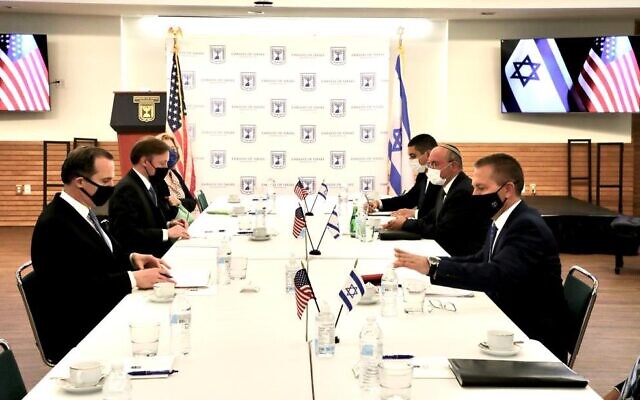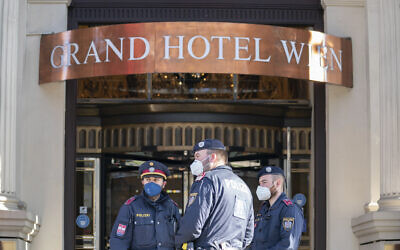Mossad chief slated to meet Blinken in Washington as Jerusalem seeks to make case against US reentry into nuclear treaty

The Israeli and American national security advisers met in Washington on Tuesday to discuss concerns over Iran’s nuclear ambitions and US efforts to reenter the deal between Tehran and world powers.
The meeting between National Security Council chairman Meir Ben-Shabbat and his US counterpart Jake Sullivan marked the first in-person meeting of high-level officials from the two countries since US President Joe Biden entered the White House.
“The US and Israeli officials discussed their serious concerns about advancements in Iran’s nuclear program in recent years. The United States updated Israel on the talks in Vienna and emphasized strong US interest in consulting closely with Israel on the nuclear issue going forward,” a readout from the White House said.
“The United States and Israel agreed on the significant threat posed by Iran’s aggressive behavior in the region, and US officials underscored President Biden’s unwavering support for Israel’s right to defend itself,” the statement added.

Ben-Shabbat and Sullivan head the bilateral strategic group aimed at Israeli-US cooperation in the effort to prevent Iran from obtaining a nuclear weapon. The group has convened virtually twice in recent months.
According to the White House on Tuesday, another such bilateral group would be established, with a focus on Iranian drones and missiles. “The United States and Israel agreed to establish an inter-agency working group to focus particular attention on the growing threat of Unmanned Aerial Vehicles and Precision Guided Missiles produced by Iran and provided to its proxies in the Middle East Region,” it said.
Also attending the session at the Israeli embassy in Washington on Tuesday were Israeli Ambassador to the US Gilad Erdan; Biden’s nominee for Deputy Assistant Secretary of State for Near Eastern Affairs Barbara Leaf; and NSC Coordinator for the Middle East and North Africa Brett McGurk.
Mossad intelligence agency chief Yossi Cohen was also seen entering the embassy. Channel 12 reported that Cohen and Erdan were slated to meet with US Secretary of State Antony Blinken, also to discuss the Iran nuclear issue.
Israel Defense Forces Chief of Staff Aviv Kohavi earlier this week canceled his participation in the security delegation to Washington amid rising tensions on the Gaza border.
Following the meeting between Sullivan and the Israeli officials, the White House on Tuesday also condemned rocket fire from Gaza on Israel and clashes in Jerusalem between Jews and Arabs.
“The two sides also shared concerns about recent violent confrontations in Jerusalem and the US officials welcomed Israel’s recent calls for calm. The US strongly condemned the recent indiscriminate rocket attacks from Gaza into Israel. US officials affirmed this administration’s continued support for efforts to advance peace between Israelis and Palestinians and a two-state solution to the conflict,” it said.
Indirect talks in Vienna between Iran, the US and other major powers are aimed at reviving the Joint Comprehensive Plan of Action that has been on life support since former president Donald Trump withdrew from the agreement in 2018. Trump’s administration subsequently issued a host of sanctions against Iran as part of its “maximum pressure” strategy aimed at coaxing Tehran into a stricter agreement to curb its nuclear weapons program.
Biden has sought to reenter the US into the JCPOA, but has refused to do so until Iran returns to compliance with the agreement. Following Trump’s withdrawal, Iran engaged in a rush to enrich uranium, recently ramping up levels to an unprecedented 60 percent, in a policy that has been vehemently opposed by the international community.
הסתיימה הפגישה בין ראש המועצה לביטחון לאומי של ארה״ב סאליבן עם השגריר ארדן וראש המלל בן שבת pic.twitter.com/nWxUuScqp1
— יונה לייבזון yuna leibzon (@YunaLeibzon) April 27, 2021
Israel has urged Biden to maintain Trump’s policy of “maximum pressure” and claimed that returning to the JCPOA now would squander the leverage accumulated by the US as a result of the sanctions that have damaged the Iranian economy.
Jerusalem was calling for a new deal that also addresses Iran’s ballistic missile program along with its support for terror groups in the region.
The US supports such goals but has argued that it cannot reach a new, expanded deal without first returning to the existing pact. Moreover, Washington points out that Iran is now closer to producing a nuclear bomb than it was before Trump left the JCPOA.
Israel is generally concerned that the US is rushing too quickly to return to the 2015 accord and is ignoring the concerns of Israel and other Middle Eastern countries, notably those in the Gulf.
Asked Friday whether the bilateral meetings might impact the administration’s position on rejoining the deal, White House Press Secretary Jen Psaki said: “No.”
Amb Erdan at the Israeli embassy. Also participating: Barbara Leaf, Brett McGurk. Rob Malley is expected to join. In the pics: @jakejsullivan arriving to the meeting pic.twitter.com/WichmiCSC8
— יונה לייבזון yuna leibzon (@YunaLeibzon) April 27, 2021
Prime Minister Benjamin Netanyahu instructed the Israeli delegation of security officials to voice objection to the US return to the Iran nuclear deal, but not to hold talks on the details. Netanyahu emphasized in a meeting with the delegation on Thursday that Israel is not a party in the nuclear agreement with Iran, and not committed to it.
“Israel is committed to its own security interests only and will act accordingly,” an Israeli official said.
“If in the future there are serious contacts on Iran’s part over an improved agreement, Israel will state its position on the characteristics and content that such an agreement should have,” the official added.
A blast at Iran’s Natanz nuclear plant earlier this month has been blamed on Israel, while the US denied involvement.
As reported by The Times of Israel
